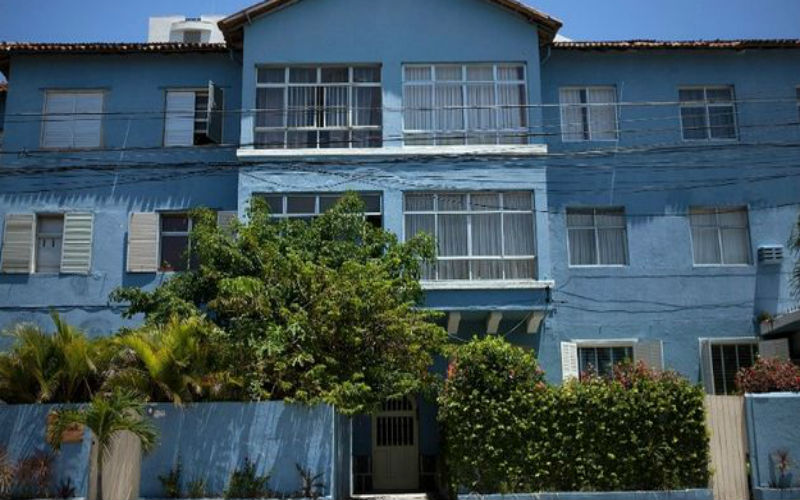




Kleber Mendonça Filho gained worldwide notoriety last year for conducting a very timely protest on a star-studded platform. The filmmaker and the crew of his latest movie Aquarius held signs on the red carpet of the Cannes Film Festival in May last year denouncing the coup d’état, which was taking place in Brazil then. Images of the unusual gesture (pictured below) circulated the world, stamping the cover of many international newspapers (including The Guardian). The action coincided with start of coup process in Brazil, and the opening of the film months later (in August) took place at exactly the same time as the illegitimate ousting of President Dilma Rousseff.
But Kleber isn’t just a sexy moustached face on the red carpet. At present, he is the most commercially and critically acclaimed filmmaker in Brazil, with just two feature films under his belt. The outstanding Neighbouring Sounds (2011) explores the dull urban cacophony that ties together middle-class neighbours in the Brazilian city of Recife (Kleber’s hometown). It was elected by the New York Times as one of the best films of the past 10 years – click here for our exclusive review of the movie. Last year’s Aquarius tells the story of Clara, played by the legendary Sônia Braga, a woman who resists property developers who want to knock down the building where she has lived all of her life. She uses nostalgia as a shield against her fast-changing and deeply corrupt society, as well as an instrument for both physical and emotional survival – click here for our review of the equally splendid movie.
After showing at the BFI London Film Festival last year, Aquarius will be released in theatres all around the country on Friday, March 24th. Kleber traveled to the UK specially for the occasion, and DMovies‘ editor Victor Fraga met up with him for a dirty talk. We chatted the commercial success, prestige, democracy, the future of Brazilian cinema, Recife, Robocop, happy umbrellas and much more!
…
Victor Fraga – Brazil is still a very exotic country in Britain, and most people would know neither where Recife is located nor that there was a coup d’état last year. How do you think people will relate to your film here?
Kleber Mendonça Filho – When I make a film I ask myself: will anybody see it, will it make any sense, will anyone care? I think every filmmaker should bear that in mind. I have been very lucky since I started making short films because they seem to travel quite well. All of my films did very well both in Brazil and internationally. In Neighbouring Sounds, I shot the film on the street where I live, it’s almost like a home movie, and made with just under $1 million, and it went to countries I never imagined it would.
With Aquarius, it’s even bigger. And the same story seems to take place everywhere. I’m convinced that people will relate to my film wherever there’s money and real estate. The main conflict is well understood by people everywhere. Of course you might miss out on a few details if you are not Brazilian. There are certain flavours that were built into the film which are naturally local. But I don’t think this will prevent Brits from understanding the film.

VF – So, Brits don’t need to know where Recife is in order to understand your film?
KMF – No. I grew up watching films from all over the world, as I’m sure you have. When I was at university I realised that American films were very good at presenting something that doesn’t belong to a specific culture. I love when films have a certain title which refers to a place. Such as Brighton Beach Memoirs [Gene Saks, 1986], The Umbrellas of Cherbourg [Jacques Demy, 1964], Woody Allen’s Manhattan [1979] and so on. I never knew where Cherbourg was until I watched the movie.
VF – But the Umbrellas of Cherbourg doesn’t mention Cherbourg in Brazilian title of the movie! [the film is called Os Guarda-Chuvas do Amor in Brazil, Portuguese for “The Umbrellas of Love”]
KMF – [sniggers] That’s true, oh well. Still, It was because of this film that I learnt where Cherbourg is. I love this mystifying power of cinema. I’m happy to report that the same is happening to my films in relation to Recife. This building here [he shows a picture of the eponymous Aquarius Building in Recife], they want to list it, to make it into a World Heritage Site, and my film can take the credit for that. Cinema has such power, and I’m glad that my film is doing it to this beautiful building.
VF – This is a very good moment for Brazilian cinema, 12 films at the last Berlin Film Festival, seven in Rotterdam, and the organisation Cinema do Brasil has more than 150 films in their catalogue. Are you concerned that the current coup-mongering government of Brazil will destroy this incredible momentum?

KMF – That’s the big question that everyone in the Brazilian film industry is asking right now. A lot of what we are seeing today, such as the films in Berlin and Rotterdam, the international acclaim of Neon Bull (Gabriel Mascaro, 2015) and The Second Mother (Anna Muylaert, 2015), this is all the result of years of investment and policy development supporting Brazilian film.
On one hand, we have a bunch of commercial films doing very well in Brazilian theatres. People think I’m against commercial movies, and that’s ridiculous. I just happen to belong to the other side, where we get more prestige than money. Although Aquarius had box office earnings which are not typical of a 150-minute film shot in Recife with a 65-year-old female protagonist [Clara, played by Sônia Braga]. So my film was both commercially successful and prestigious. And a lot of that came from the policies implemented by Lula from 2003. This is the incontestable truth. Some people might dislike the previous left-wing government of Brazil, but they can’t challenge this reality, which started with Lula and continued with Dilma. And now we have a completely different government, which is systematically destroying many public policies, there’s a grey cloud hanging over Brazilian cinema.
VF – Yourself, Cláudio Assis, Gabriel Mascaro, Marcelo Gomes, some of the Brazil’s most creative filmmakers are all from Recife. What is it with cinema from Pernambuco [the state where Recife is located]. Is it something in the water?
KMF – That’s a very tough question. Recife seems to be some sort of breeding ground, and not just for cinema. It is in literature, in the arts, in music. That was particularly true of the 1990s with the Mangue Beat movement in the music scene. And now we have the film scene, which is very strong! My theory is that after 400 years of sugarcane monoculture, when we were only known for sugarcane plantations and nothing else, things changed. This generated some inside mechanism forcing us to think “multi” instead of “mono”. With the presence of the Dutch invaders, combined with the distance from Rio de Janeiro and São Paulo, which were quite far away, we ended up with this very interesting breeding ground for culture.
Your question is asked every day in Brazil, particularly by cariocas as paulistas [people from Rio and São Paulo, respectively], and everybody is trying to understand how such cultural strength came to being.
VF – Globo is everywhere in Brazil: on print, the Internet, television and also in cinema, including your film [which was produced by Globo Filmes]. Do you think that it’s healthy for cinema, television and so on to be under purview of one single, extremely powerful organisation?
KMF – It’s not healthy at all. This is a huge discussion in Brazil right now. We need diversity of criticism and of points-of-view. Globo has historically, since the 1960s, dominated the media in Brazil, particularly in television. They have found ways of becoming even more diverse with the Internet and cable television. Now the power of Globo is being questioned through the Internet and social media, Netflix, Facebook and YouTube. At least now we can see some change in Globo’s outreach.
VF – What kind of changes?
KMF – People attention is being diverted to YouTube, Netflix (which is incredibly strong in Brazil) and so on. Plus people make their own programming.
VF – And how does that affect the film industry?
KMF – We have an interesting relation with Globo Filmes because I have always been their vocal critic. At the time of Neighbouring Sounds, I had a major fall out with their president Cadu Rodrigues. But now they have a completely new way of looking at Brazilian film, not just in relation to the “commercial side” but also to the “prestigious side”. It was very interesting that we got them to support Aquarius, you know why?
VF – No, but I’m sure you’re going to tell me!
KMF – Aquarius is going to show on prime time Brazilian television, on Globo’s open channel. This is unheard of for such a long and non-commercial movie. For me that’s diversity.

VF – Film is a weapon for change, for denunciation, and you made good use of that in Cannes, when you held signs denouncing the Brazilian coup d’état on the famous red carpet. Can you tell us a little bit about the retaliation you have experienced since? And would you do it again?
KMF – If I had a time machine I could go back to May last year, I would have done exactly what we did. We as Brazilian citizens just did a very simple protest expressing our opinion about what was happening in Brazil: the democratic process in that very month [May 2016], and the result is what we see now. We were thinking of what’s happening right now back then. We has no choice but to quietly say: “this is wrong!”. And that what we did.
We had a lot of support for what we did, but also a lot of attacks, particularly on social media. And these attacks can be quite ravenous. Drunk and lonely guys on a Friday night go online and post some crazy shit about the film and about you. But this also brought attention to my movie. They tried to boycott it, which made it even bigger. It was just a crazy time when the film opened in Brazil, with the official ousting of Dilma Rousseff taking place then, in August, at the weekend of our release.
VF – The biggest Brazilian filmmakers of the past 20 years have all embraced an international career, including Sales with Motorcycle Diaries (2004), Fernando Meirelles with The Constant Gardener (2005) and José Padilha with RoboCop (2014). Will you be doing the same?
KMF – I’m open to possibilities, but it’s not like I dream of making a film in Hollywood.
VF – So you won’t be remaking RoboCop yet again for us then?
KMF – I would never in my life remake a film that I love, I just don’t see the point. And I absolutely love RoboCop [the 1987 original by Paul Verhoven] But, you know, good luck to… well, you know what I’m talking about! [at this stage, it’s worthwhile pointing out that José Padilha, who remade RoboCop, is one of the very few filmmakers in Brazil who supported the 2016 coup d’état].
If I make an interesting discovery in a book or a script then of course I would consider making a film abroad. But I would never make a film for some big shot just for the sake of making money. I wouldn’t do something that’s purely industrial, and not personal at all.
…
Don’t forget to read:
















